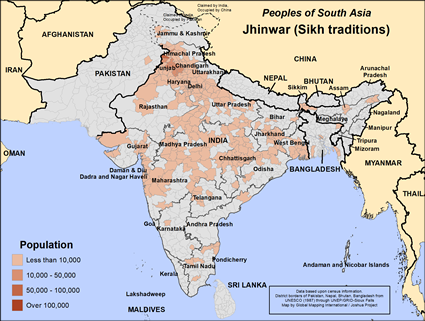Jhinwar (Sikh traditions) in India

Photo Source:
Anonymous
|

Map Source:
People Group data: Omid. Map geography: UNESCO / GMI. Map Design: Joshua Project.
|
| People Name: | Jhinwar (Sikh traditions) |
| Country: | India |
| 10/40 Window: | Yes |
| Population: | 411,000 |
| World Population: | 411,000 |
| Primary Language: | Punjabi, Eastern |
| Primary Religion: | Other / Small |
| Christian Adherents: | 0.00 % |
| Evangelicals: | 0.00 % |
| Scripture: | Complete Bible |
| Ministry Resources: | Yes |
| Jesus Film: | Yes |
| Audio Recordings: | Yes |
| People Cluster: | South Asia Sikh - other |
| Affinity Bloc: | South Asian Peoples |
| Progress Level: |
|
Introduction
The traditional occupations of the Jhinwar have been fishing, boating and carrying water. Others work in agriculture as farmers or day laborers. Urban Jhinwar work in factories and construction, while educated Jhinwar work in professions such as teaching, accounting, engineering and government administration.
Ministry Obstacles
The Jhinwar embrace Sikhism, which teaches that all people have equal access to God. The Sikh God is formless, without gender and found in everyone. One gets closer to God by living a good life and by practicing charity. Like Hindus, Sikhs believe in reincarnation and the law of karma.
Outreach Ideas
Pray for the Followers of Christ
Pray for the Entire People Group
Pray that God's Holy Spirit would open hearts among Jhinwar and give them a hunger for spiritual truth that will point them to Jesus Christ and the Bible.
Ask the Lord to thrust out new workers who will lovingly commit to these until they have a church planting movement.
Ask God for a movement to Christ to sweep through all Sikh Jhinwar communities.
Pray for the few Jhinwar Christ followers to be salt and light to their community.
A tiny fraction among the Jhinwar call themselves believers. Ask God to help the majority hear and understand the life-changing message of Jesus Christ.
Ask God to send workers who will reach out with the love of Christ in practical ways.